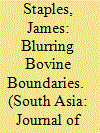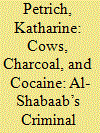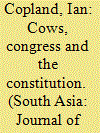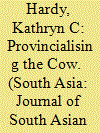|
|
|
Sort Order |
|
|
|
Items / Page
|
|
|
|
|
|
|
| Srl | Item |
| 1 |
ID:
169999


|
|
|
|
|
| Summary/Abstract |
Drawing on ethnographic fieldwork with butchers, cattle traders and beef eaters in South India, the aims of this paper are twofold. Firstly, it challenges two dominant assumptions made in respect of cattle slaughter and beef consumption in South Asia: one, that the beef trade directly concerns only Muslims, Dalits, Adivasis and Christians, and two, that respect for cattle is the near sole preserve of upper-caste Hindus. Secondly, given the strength of the empirical evidence against these two assumptions, it considers how such a stark framing of the debates along caste and communal lines has been sustained so successfully and for so long. Using insights from the anthropology of ignorance—to which this article makes a unique contribution—I argue that part of the answer lies in the strategic acts of not knowing what goes on at particular junctures along the chain from the cowshed to the dinner plate, which a number of different actors are complicit in working to maintain.
|
|
|
|
|
|
|
|
|
|
|
|
|
|
|
|
| 2 |
ID:
188016


|
|
|
|
|
| Summary/Abstract |
Contrary to historical terrorism scholarship, terrorist groups can strategically diversify into a variety of criminal activities without losing their core ideology or support among the civilian population. This pattern is demonstrated by the evolutionary arc of al-Shabaab, which grew from a small subset of Somalia’s Islamic Courts Union to the most violent political actor in the Horn of Africa, able to conduct terrorist attacks as far afield as Kenya, Djibouti, and Ethiopia. Al-Shabaab has been highly successful in creating a narrative of truth and justice provision while simultaneously exploiting the Somali population and engaging in criminal activity. For the group, criminal activity and crime networks serve two primary purposes: as a funding mechanism and as an avenue for recruitment. Using ethnographic fieldwork and process tracing, I find that the group’s criminal activities throughout the Horn of Africa have made the group significantly more resilient to counterterrorism and counterinsurgency campaigns, extending both its lifespan and operational capability.
|
|
|
|
|
|
|
|
|
|
|
|
|
|
|
|
| 3 |
ID:
157085


|
|
|
|
|
| Summary/Abstract |
Added late to the draft Indian Constitution, Article 48 specifically mandated the Indian state to criminalise the killing of cows, a provision that, as well as being arguably at odds with at least three of the document's Directive Principles, was implicitly anti-Muslim. The provision was adopted, almost without demur, by a Constituent Assembly dominated by the Congress at a time when discrimination against the Indian Muslim minority in other fields was rife. With hindsight, the making of Article 48 can be seen as the first victory in post-colonial India of the nascent Hindu Right, preceding as it did even the formation of the country's first effective Hindu political party, the Bharatiya Jana Sangh. This paper investigates how, and why, the cause of cow protection came to be supported (and effectively sponsored) in the Assembly by senior members of a supposedly secular Congress parliamentary caucus headed by staunch anti-communalist, agnostic and Muslim sympathiser, Prime Minister Jawaharlal Nehru.
|
|
|
|
|
|
|
|
|
|
|
|
|
|
|
|
| 4 |
ID:
170001


|
|
|
|
|
| Summary/Abstract |
This paper examines the ritual and everyday practices of a family of buffalo-keeping Yadavs in Varanasi, Uttar Pradesh. Water buffalo and indigenous Indian cattle are described as biologically and socially distinct beings: buffalo are economic animals, favoured for milk production, but ritually devalued and legally killable; cattle are sacred, protected from slaughter. Cows have historically been the animals central to public imaginations of Hindu belonging in scholarship and popular politics. But buffalo, not cows, are the animals central to Yadav self-making. This paper shows how heterodox bovine beliefs and everyday practices knit buffalo into a capacious Hindu interspecies world that subverts contemporary cow politics.
|
|
|
|
|
|
|
|
|
|
|
|
|
|
|
|
|
|
|
|
|